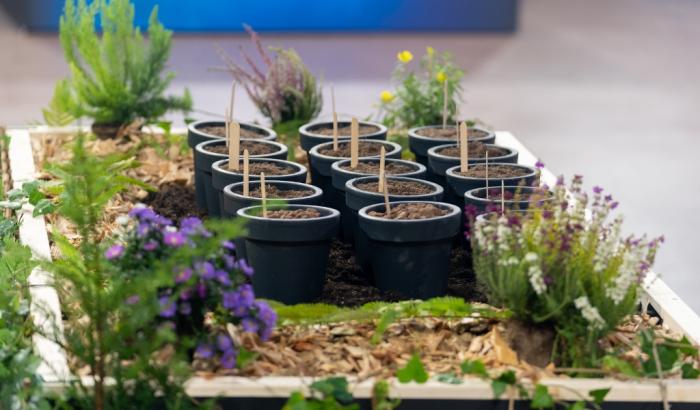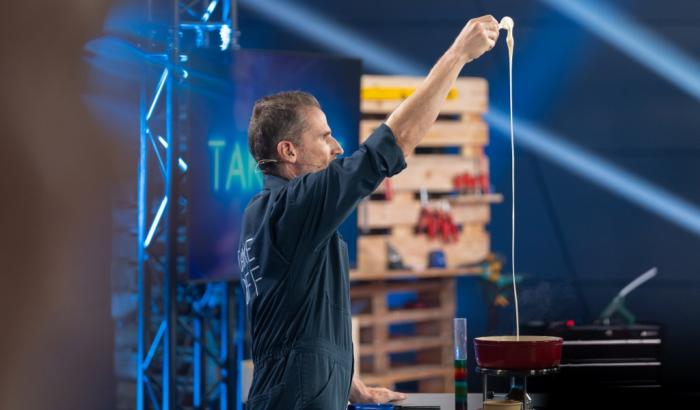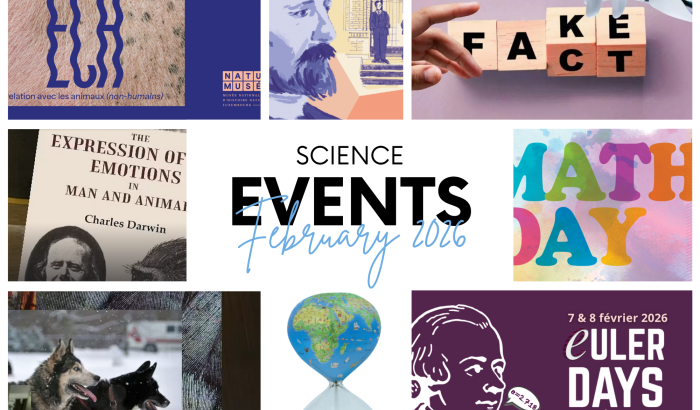ID CARD
- Name: Polina Kavunenko
- Age: 16
- Lycée: Athénée du Luxembourg
- Hobbies: Sports, music (guitar and piano), Youth group
- Best at: Organisation and logical thinking
- Motto: „Love each other. Love everybody, even your enemies.”
Polina, a born Ukrainian used to being on the move a lot, is a very social and positive person. She is also the youngest contestant of the Take Off Science Challenge Show, but her inner strength and determination allowed her to fight her way up to the final episode. During the interview, she was sitting in the sun, and a little bit of that peaceful light radiated through her words.
You were the youngest at Take Off (15 during the show). How did that feel? How did you find the courage to take part?
“Participating felt quite obvious to me. I was a bit surprised that almost no one else around me wanted to do it. The opportunity to learn fascinating new stuff felt too big to miss – plus, 10,000 euros is a lot of money!”
Did you have any scientific background that helped you during the show?
“I love biology, chemistry… You could say I have a scientific intuition, especially for biology; I kind of just understand how it works. But sometimes during the show I just lacked common knowledge, probably due to my young age. There was this one challenge where the duellists had to melt ice… (NDLR: episode 2, “Energy”) and everybody knew that salt melts ice – everybody but me! But otherwise, yes, I think of myself as a pretty scientific person.”
But how does someone that young solve such difficult challenges? “For the first casting, we tried learning some last-minute random science facts because we were quite stressed – but that wasn’t necessary. Using your brain at the right moment – that was the trick. Logical thinking goes a long way in this show.”
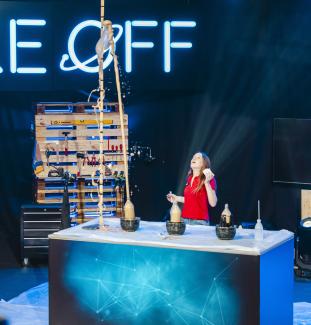
What was the mood on and off stage?
“At the end of every film week, we would gather, and we could finally talk about the show, the challenges, and the funny moments without being stressed. It was amazing how well we all connected. I wasn’t expecting that. Nobody wanted to betray or hurt anybody to win.”
“I also liked the filming of social media stuff. We all ate together afterwards, relaxed, and had time for fun... It felt like we were a team of superheroes, where everybody brings along his own special superpower.”
Teamwork: an asset or a problem?
“At the beginning, when we were 4 people per team, it did feel a little crowded. Additionally, all my teammates were much older (up to 6 years!) so at first, I just tried helping without giving any ideas of my own. But as the teams got smaller, it got much easier and quicker to communicate.”
“Generally, I work better alone so I largely preferred the challenges I had to do on my own. That I didn’t find scary. But when I was the only girl left, and all these men I was contending against were much older than me, I felt quite intimidated… It turned out to be fun.”
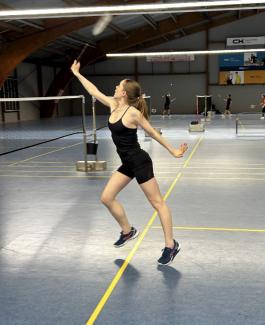
What do you like to do outside of school? Do you miss Kyiv?
“I do a lot of sports and music (guitar, piano, solfège). I recently joined a church and a youth group, and the social meetings are great. We talk a lot about big and small things.”
“I grew up in Kyiv and remember some beautiful places I visited with my grandmother. Museums, the river… I miss the food, which is amazing. And the sports centres. They are huge: inside you find swimming pools, tennis courts, bars, places for kids, the gym… everything!”
Following the news has been quite hard for Polina in the past two wears. “Most of my family moved to Luxembourg. The last to follow were my grandparents, who moved after the war began. That was hard. But now, everyone is safe.”
How did you manage your stress level during the show?
“I went to a very demanding school in Kyiv, and I think that helped because I'm used to academic pressure. But as the show went on, the challenges got insanely stressful. At one point I was literally shaking with anticipation, and the only thing that helped was yoga. But then came the makeup artist, and I had to tell her to wait just a second, so that I could finish the pose! That must have looked quite funny. I also pray a lot, which helps me calm down.”
What did you learn during the show?
Polina laughs: “I learned how to use a drill! But also, how to work in a team with people I didn’t know. Our team was structured in a weird way because we were all very different: where we grew up, our age and even our thinking processes were different. We had to learn how to work together. That was scary at first, but as the others were incredibly smart and creative, I really enjoyed working with them. My impression is that everyone grew during the show.”
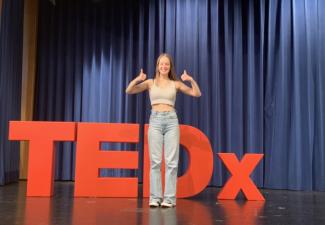
What advice would you give future Take Off contestants?
“Put in a lot of effort when you sign up and do the castings. Show the jury that you are passionate about what you do. I think that is what they are looking for: determined, passionate people who really mean it, regardless of their background or knowledge. Everyone gets a chance in this show.”
Do you know what you want to do later in life?
“I want to be a dentist and have my own practice. As a child, I wanted to be a hairdresser, a cabin crew person, a lawyer, and a doctor. I realised I wanted to be a dentist a few months ago because it is such a nice gift to give people a beautiful smile. I’d love to study in Tuscany…”
Let's wish her success!
Author: Diane Bertel
Editors: Lucie Zeches (FNR), Michele Weber (FNR)
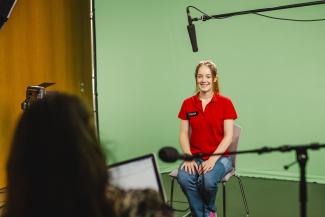
Dieser Artikel ist Teil einer Serie
- 1 / 7 Take Off Kandidatin Nicole Duque im Interview Lesen
- 2 / 7 Take Off Kandidat Matthieu Hoffmann im Interview Lesen
- 3 / 7 Interview mam Karim Pereira, Kandidat vun Take Off Lesen
- 4 / 7 Interview with Take Off contestant Lenny Kakou Lesen
- 5 / 7 Interview mam Alex Tomé, Kandidat bei Take Off Lesen
- 6 / 7 Take Off Kandidat Jamie Ley im Interview Lesen
- 7 / 7 Interview with Take Off finalist Polina Kavunenko Lesen

